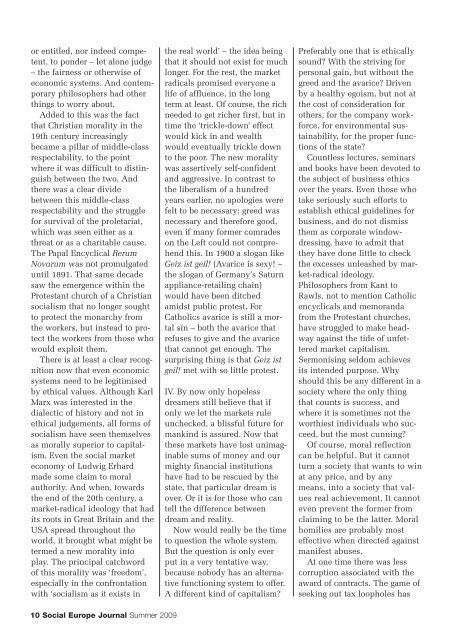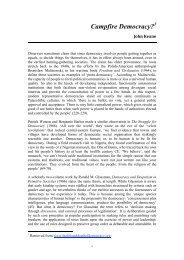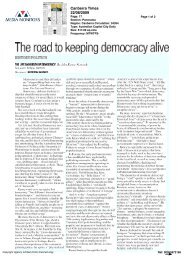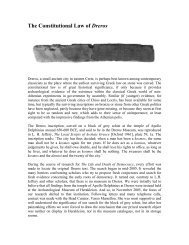The Ethics of Capitalism - Social Europe Journal
The Ethics of Capitalism - Social Europe Journal
The Ethics of Capitalism - Social Europe Journal
You also want an ePaper? Increase the reach of your titles
YUMPU automatically turns print PDFs into web optimized ePapers that Google loves.
or entitled, nor indeed competent,<br />
to ponder – let alone judge<br />
– the fairness or otherwise <strong>of</strong><br />
economic systems. And contemporary<br />
philosophers had other<br />
things to worry about.<br />
Added to this was the fact<br />
that Christian morality in the<br />
19th century increasingly<br />
became a pillar <strong>of</strong> middle-class<br />
respectability, to the point<br />
where it was difficult to distinguish<br />
between the two. And<br />
there was a clear divide<br />
between this middle-class<br />
respectability and the struggle<br />
for survival <strong>of</strong> the proletariat,<br />
which was seen either as a<br />
threat or as a charitable cause.<br />
<strong>The</strong> Papal Encyclical Rerum<br />
Novarum was not promulgated<br />
until 1891. That same decade<br />
saw the emergence within the<br />
Protestant church <strong>of</strong> a Christian<br />
socialism that no longer sought<br />
to protect the monarchy from<br />
the workers, but instead to protect<br />
the workers from those who<br />
would exploit them.<br />
<strong>The</strong>re is at least a clear recognition<br />
now that even economic<br />
systems need to be legitimised<br />
by ethical values. Although Karl<br />
Marx was interested in the<br />
dialectic <strong>of</strong> history and not in<br />
ethical judgements, all forms <strong>of</strong><br />
socialism have seen themselves<br />
as morally superior to capitalism.<br />
Even the social market<br />
economy <strong>of</strong> Ludwig Erhard<br />
made some claim to moral<br />
authority. And when, towards<br />
the end <strong>of</strong> the 20th century, a<br />
market-radical ideology that had<br />
its roots in Great Britain and the<br />
USA spread throughout the<br />
world, it brought what might be<br />
termed a new morality into<br />
play. <strong>The</strong> principal catchword<br />
<strong>of</strong> this morality was ‘freedom’,<br />
especially in the confrontation<br />
with ‘socialism as it exists in<br />
the real world’ – the idea being<br />
that it should not exist for much<br />
longer. For the rest, the market<br />
radicals promised everyone a<br />
life <strong>of</strong> affluence, in the long<br />
term at least. Of course, the rich<br />
needed to get richer first, but in<br />
time the ‘trickle-down’ effect<br />
would kick in and wealth<br />
would eventually trickle down<br />
to the poor. <strong>The</strong> new morality<br />
was assertively self-confident<br />
and aggressive. In contrast to<br />
the liberalism <strong>of</strong> a hundred<br />
years earlier, no apologies were<br />
felt to be necessary: greed was<br />
necessary and therefore good,<br />
even if many former comrades<br />
on the Left could not comprehend<br />
this. In 1900 a slogan like<br />
Geiz ist geil! (Avarice is sexy! –<br />
the slogan <strong>of</strong> Germany’s Saturn<br />
appliance-retailing chain)<br />
would have been ditched<br />
amidst public protest. For<br />
Catholics avarice is still a mortal<br />
sin – both the avarice that<br />
refuses to give and the avarice<br />
that cannot get enough. <strong>The</strong><br />
surprising thing is that Geiz ist<br />
geil! met with so little protest.<br />
IV. By now only hopeless<br />
dreamers still believe that if<br />
only we let the markets rule<br />
unchecked, a blissful future for<br />
mankind is assured. Now that<br />
these markets have lost unimaginable<br />
sums <strong>of</strong> money and our<br />
mighty financial institutions<br />
have had to be rescued by the<br />
state, that particular dream is<br />
over. Or it is for those who can<br />
tell the difference between<br />
dream and reality.<br />
Now would really be the time<br />
to question the whole system.<br />
But the question is only ever<br />
put in a very tentative way,<br />
because nobody has an alternative<br />
functioning system to <strong>of</strong>fer.<br />
A different kind <strong>of</strong> capitalism<br />
Preferably one that is ethically<br />
sound With the striving for<br />
personal gain, but without the<br />
greed and the avarice Driven<br />
by a healthy egoism, but not at<br />
the cost <strong>of</strong> consideration for<br />
others, for the company workforce,<br />
for environmental sustainability,<br />
for the proper functions<br />
<strong>of</strong> the state<br />
Countless lectures, seminars<br />
and books have been devoted to<br />
the subject <strong>of</strong> business ethics<br />
over the years. Even those who<br />
take seriously such efforts to<br />
establish ethical guidelines for<br />
business, and do not dismiss<br />
them as corporate windowdressing,<br />
have to admit that<br />
they have done little to check<br />
the excesses unleashed by market-radical<br />
ideology.<br />
Philosophers from Kant to<br />
Rawls, not to mention Catholic<br />
encyclicals and memoranda<br />
from the Protestant churches,<br />
have struggled to make headway<br />
against the tide <strong>of</strong> unfettered<br />
market capitalism.<br />
Sermonising seldom achieves<br />
its intended purpose. Why<br />
should this be any different in a<br />
society where the only thing<br />
that counts is success, and<br />
where it is sometimes not the<br />
worthiest individuals who succeed,<br />
but the most cunning<br />
Of course, moral reflection<br />
can be helpful. But it cannot<br />
turn a society that wants to win<br />
at any price, and by any<br />
means, into a society that values<br />
real achievement. It cannot<br />
even prevent the former from<br />
claiming to be the latter. Moral<br />
homilies are probably most<br />
effective when directed against<br />
manifest abuses.<br />
At one time there was less<br />
corruption associated with the<br />
award <strong>of</strong> contracts. <strong>The</strong> game <strong>of</strong><br />
seeking out tax loopholes has<br />
10 <strong>Social</strong> <strong>Europe</strong> <strong>Journal</strong> Summer 2009







